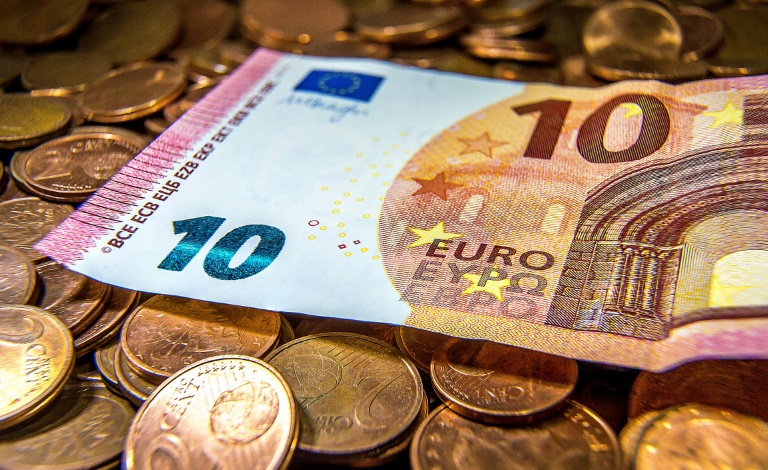The euro retreated against the dollar Thursday as economic data pointed to increased prospects of recession in Europe.
Global stock markets wobbled after another battering this week, while oil prices slid further.
Economic growth in the eurozone plummeted in June, a key survey showed, as high prices took the wind out the strong recovery from the deep lows of the coronavirus pandemic.
The closely-watched monthly purchasing managers’ index by S&P Global slumped to 51.9 from 54.8 in May. A figure above 50 indicates growth.
PMI data also revealed that Britain’s private sector business activity is languishing at its lowest level for more than a year on decades-high inflation.
“The latest PMI numbers from France and Germany have weighed on the euro, with economic activity slowing more than expected in June, raising concerns that both countries are heading into a recession,” said market analyst Michael Hewson at CMC Markets.
“While ECB (European Central Bank) policymakers continue to insist that a recession isn’t their base case, all the evidence points to exactly that,” he added.
European stocks also fell, with London ending the day down 1.0 percent and Paris shedding 0.6 percent. Frankfurt tumbled 1.8 percent after Germany hiked its alert level about natural gas supplies, taking it one step closer to rationing.
Government bond yields also fell in another indication that investors are more worried about the prospect of a recession, removing some of the financial sting on governments from rising interest rates.
“The global economy continues to be afflicted by severe supply shocks, which are pushing up inflation and driving down growth,” noted Citi analyst Nathan Sheets.
“We see the aggregate probability of recession as now approaching 50 percent,” he added.
Commentators have warned for some time that the world economy could be heading for contracting growth owing to the sharp increase in global interest rates aimed at cooling inflation.
Federal Reserve boss Jerome Powell on Wednesday said recession in the short term was “certainly a possibility”.
He said “inflation has obviously surprised to the upside over the past year, and further surprises could be in store”.
The Fed this month hiked US interest rates by 75 basis points and is expected to do the same in July, with some observers predicting two more such moves after that.
US PMI data also showed a slowdown in growth similar to that in Europe, but Wall Street stocks rose in morning trading as US Treasury bond yields fell.
“A retreat in the US 10-year yield has sparked buying,” said David Madden at Equiti Capital.
Patrick O’Hare at Briefing.com called this a “myopic” move by investors as “long-term rates are dropping because growth prospects are dropping — and if growth prospects are dropping, so are earnings prospects” for companies.
The prospect of a retreat in the global economy continued to drag on oil prices as traders fretted over slowing demand.
Brent and WTI, the international and US benchmarks, have slumped over the past week, even with sanctions on Russian crude exports and China’s gradual reopening from lockdowns.
Adding to the selling of crude was data Wednesday indicating a jump in US stockpiles.
– Key figures at around 1530 GMT –
Euro/dollar: DOWN at $1.0516 from $1.0570 late Wednesday
Pound/dollar: DOWN at $1.2258 from $1.2263
Euro/pound: DOWN at 85.77 pence from 86.17 pence
Dollar/yen: DOWN at 134.64 yen from 136.22 yen
New York – Dow: UP 0.1 percent at 30,517.27 points
EURO STOXX 50: DOWN 0.6 percent at 3,442.31
London – FTSE 100: DOWN 1.0 percent at 7,020.45 (close)
Frankfurt – DAX: DOWN 1.8 percent at 12,912.59 (close)
Paris – CAC 40: DOWN 0.6 percent at 5,883.33 (close)
Tokyo – Nikkei 225: UP 0.1 percent at 26,171.25 (close)
Hong Kong – Hang Seng Index: UP 1.3 percent at 21,273.87 (close)
Shanghai – Composite: UP 1.6 percent at 3,320.15 (close)
Brent North Sea crude: DOWN 0.6 percent at $111.13 per barrel
West Texas Intermediate: DOWN 0.8 percent at $105.38 per barrel
burs-rl/lth










